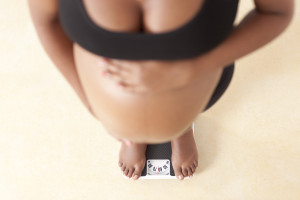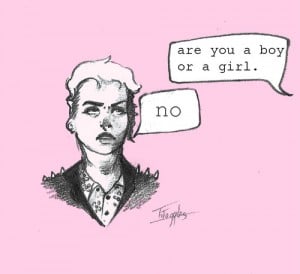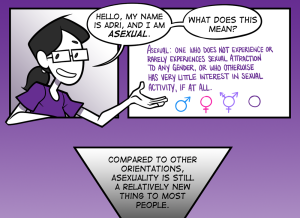At the end of May, I had my third child. And among all of the emotions I felt, one that washed over me was relief at no longer being pregnant.
Now, there are a lot of reasons for that – including the fact that I tend to experience pregnancy as a means to a pretty great (though utterly exhausting) end, and not exactly as a rewarding period in and of itself.
But there’s another reason I was happy not to be pregnant anymore: I find the physical scrutiny pregnant people experience incredibly oppressive.
And that’s because when someone is pregnant, their body seems to become fair game for comments from everyone from strangers, to family members, colleagues and, of course, healthcare providers.
And while some of the comments directed at pregnant people are of the complimentary (read: “You’re glowing”) variety, a lot fall into the fat shaming camp.
Of course, though some pregnant people feel that pregnancy is a time to be free of body image issues, for those who don’t get this mental health break, fat shaming during pregnancy can be uniquely tough.
And like a lot of fat shaming, much of that which happens during pregnancy is typically defended on the basis of suspect health claims – an issue problematic in and of itself since many of these are not as scientifically proven as we’re often led to believe.
But there is something else going on as well..
Pregnancy fat shaming is also the product of discomfort with pregnancy itself – and it arises from a desire to control a seemingly out of control body.
And here’s how: Though a pregnancy is carried in the uterus and not the in stomach, the area that expands most noticeably is the midsection – a place many of us equate with eating.
As a result, in many people’s minds, the larger the belly, the more a pregnant person must be scarfing down, something we (and especially women) often learn we shouldn’t be doing in the first place.
(In fact, a British survey found that a startling number of women hide both the amount and the nature of what they eat from others, including their partners!).
Take all of these factors together, and what you get is a lot of people throwing around common pregnancy fat shaming justifications, under the supposed guise of “health concern.”
And here are three that we really have to stop buying into.
1. “You’re Putting Yourself and Your Baby at Risk by Gaining ‘Too Much’ Weight”
Pregnant people generally want to have the best possible outcomes for their babies.
Because of this, they’re often particularly sensitive to messages about taking care of their health, and many heed warnings about the risks of drinking alcohol, eating fish, taking certain medications, or even dyeing their hair when pregnant.
But increasingly, these messages have included the admonishment that gaining “too much” weight could also harm their babies.
And these messages have, in fact, increased.
For example, in the nine years between my own three pregnancies, the weight gain guidelines I was given by my doctor changed from 25-35 pounds to 25-30 pounds!
When I asked my (otherwise awesome) OBGYN, the same person I had seen when pregnant the last two times, why this had happened, she said, “Well, new studies have found that you’ll just have fewer complications if you stay under 30 pounds. Plus, it’s easier to drop the pregnancy weight if you have less to lose.”
But new studies have been changing the guidelines on maternal weight gain for at least the past 100 years, and while many outcomes for babies have improved, a lot haven’t.
For example, Save the Children’s 2015 State of the World’s Mothers report found the mortality rate in the US for children under five is almost seven per 1,000 live births, significantly higher than countries like Sweden and Norway whose infant mortality rates are under two.
As the authors of a paper on pregnancy weight gain published in the American Journal of Clinical Nutrition write, “During the 20th century, recommendations for maternal weight gain in pregnancy were controversial, ranging from rigid restriction to encouragement of ample gain.”
What we’re seeing now is that after being on an upward swing since the ‘70s (due to findings that people who didn’t put on enough weight were more likely to have preterm and underweight babies), the ever increasing blame on fat for—well—just about everything, now has some providers lowering the number they tell pregnant patients to gain.
In reality, claims about the risks of “excess” weight gain during pregnancy often have less direct correlation to real dangers and more to do with our complicated relationship to fat and the idea that individuals – and not systems – should be responsible for health outcomes.
So what are the real risks?
As Dr. Emily Oster, an associate professor of Economics at Brown University, and the author of the book Expecting Better: Why the Conventional Pregnancy Wisdom Is Wrong – And What You Really Need to Know says:
“Gaining well in excess of the recommendations is associated with some increased complications – gestational diabetes, increased need for a C-section – although the evidence is much weaker on serious complications like stillbirth. But certainly gaining a few more pounds than the recommendation is not likely to change your risk for these outcomes.”
Plus, we don’t always learn that conditions like preeclampsia and gestational diabetes, as well as C-sections and stillbirths can affect anyone.
And while my anecdotal evidence is just that, I have known others to experience all of these things – and not one of them had gained a lot of pregnancy weight.
I have also known plenty of people who gained way more than the guidelines recommend and had zero complications. Go figure.
2. “You’ll Never Get Your Body Back If You Gain A Lot of Pregnancy Weight”
As if pregnancy fat shaming wasn’t bad enough, pregnant people are set up for post-pregnancy fat shaming the first time they hear (like I did from my doctor) that gaining too much weight when pregnant will mean they will have a harder time “getting their body back.”
Not only does this message assume that everyone wants to look the same before and after having a baby, but it also immediately sends the message that a bigger body is inherently a negative thing – and that a body changed by pregnancy is not a testament to the fact that it grew a baby, but rather is something unattractive that needs to be altered.
Additionally, there’s the issue that while some people are heavier post-pregnancy than they were pre-pregnancy, others are not, regardless of how much weight they gain.
While many studies have demonstrated that higher gestational weight gain leads to higher postpartum weight in the short term, few definitively show that this is a significant issue in the long run.
As the authors of a paper in the American Journal of Clinical Nutrition titled “Gestational Weight Gain and Long-Term Postpartum Weight Retention” write:
“Further studies are needed to assess whether [long-term postpartum weight retention] is causal or reflects a common cause and whether interventions based on dietary and physical activity interventions known to reduce gestational weight gain will have a similar effect on long-term postpartum weight retention.”
Such conclusions are typical in writings on the subject.
But even absent of clear proof, these speculations allow us to warn pregnant people that higher pregnancy weight gain is likely to mean they will always be “fat.”
Not only is this untrue, but dangling this over someone’s head, as if being bigger after pregnancy is just so awful, reinforces a lot of the negative messages we already get about body size.
3. “Pregnant People Are Supposed to Be a Certain Size”
Here’s something I learned during my first pregnancy: Despite the fact that pregnant people walk around every day and are a visible part of society, plenty of folks act as if they have never seen a pregnant person before – and many seem to be shocked by how much a pregnant body can grow.
That was something that a new mom I recently met in the park was keenly familiar with.
Rachel Buschert Vaziralli is a fitness trainer and as such is very familiar with body scrutiny. But for her, this became particularly apparent when she was pregnant.
Rachel explained that since she taught exercise classes throughout her pregnancy, she regularly heard comments about her body from students who expressed everything from relief at learning that she was pregnant and not just gaining weight, to nervousness about her ability to do her job, to the inevitable twin question.
As she recalled, after telling a student that she was not, in fact, having more than one baby, the response was, “Are you sure?! There’s just no way you’re that size at seven months and not having twins.”
Vaziralli was sure, but the implication of that reveal was that she must be bigger than a pregnant person carrying a single baby ought to be.
In reality, there are countless reasons one pregnant person will look larger than another. These range from our natural body sizes, to our heights, the baby’s position in the uterus, to whether we’ve been pregnant before, and various medical conditions.
For example, a petite friend of mine had a dangerous condition while pregnant which resulted in her developing an excess of amniotic fluid. As a result, she looked very pregnant.
But the last thing she needed on her way to yet another appointment to have fluid drained – something she had to do to prevent preterm labor, but which she was paradoxically warned could trigger it – was yet another person on the street commenting that she looked like she was about to pop at any second.
***
At some point during all three of my singleton pregnancies, I was asked if I was having twins.
I also got plenty of comments about how high or low I was carrying, declarations about whether I was having a boy or a girl as a result of my shape, and predictions about when I was due (usually the next day and usually met with disbelief when I replied that I still had, say, three months to go).
Logically, I could tell myself that random people on the street have no idea what pregnant bodies actually look like. But in the moment, comments like the ones that I, and plenty of other pregnant people get, can feel an awful lot like an indictment.
And in a world where fat shaming is seen as an acceptable tool to motivate people to lose weight, that’s an indictment that ever-increasing groups of people (maternity Spanx, anyone?) are becoming familiar with.
But just because we are familiar with this doesn’t mean we have to accept it.
And really, it doesn’t take a lot to turn those pregnant body judgements into pregnant body celebrations.
I mean, these bodies are growing new humans after all, something that we should keep in mind before we give a side-eye to that pregnant person enjoying a slice of cheesecake!
[do_widget id=’text-101′]
Ellen Kate is a Contributing Writer for Everyday Feminism. She’s a health educator, sometime writer, and mom. She has worked at Manhattan’s Museum of Sex, developed sex education curricula in Mumbai, India, and run HIV prevention programs for at-risk teens in the South Bronx. Currently, Ellen teaches human sexuality at Brooklyn College (something she also did at Rutgers University). Ellen also runs About.com’s LGBT Teens site. More of Ellen’s writing can be found here. Follow her on Twitter @ellenkatef.
Search our 3000+ articles!
Read our articles about:
Our online racial justice training
Used by hundreds of universities, non-profits, and businesses.
Click to learn more





















